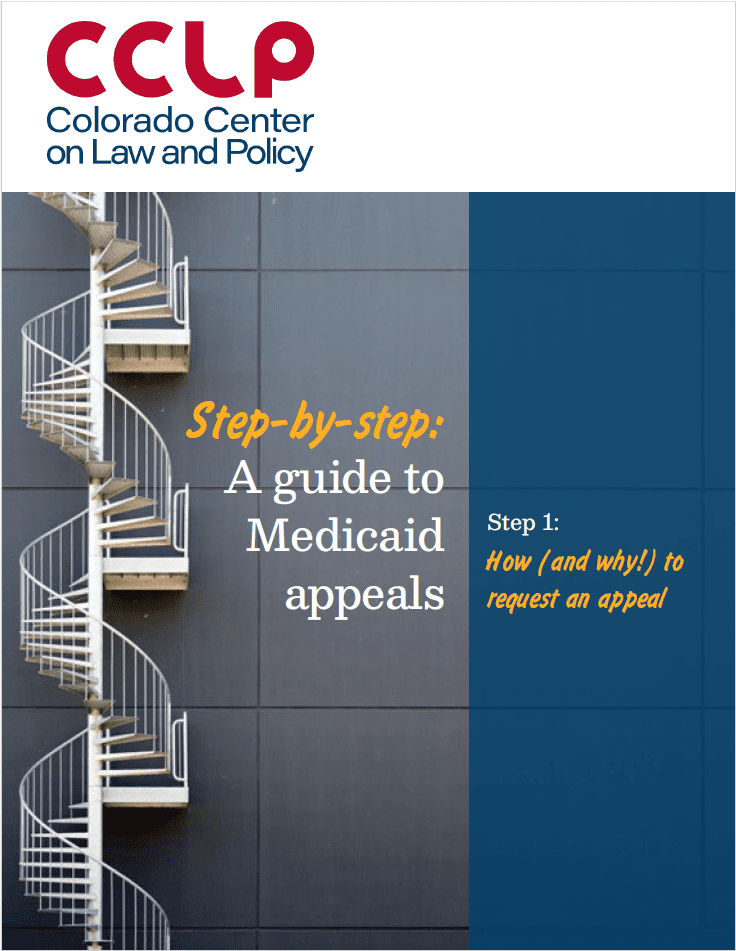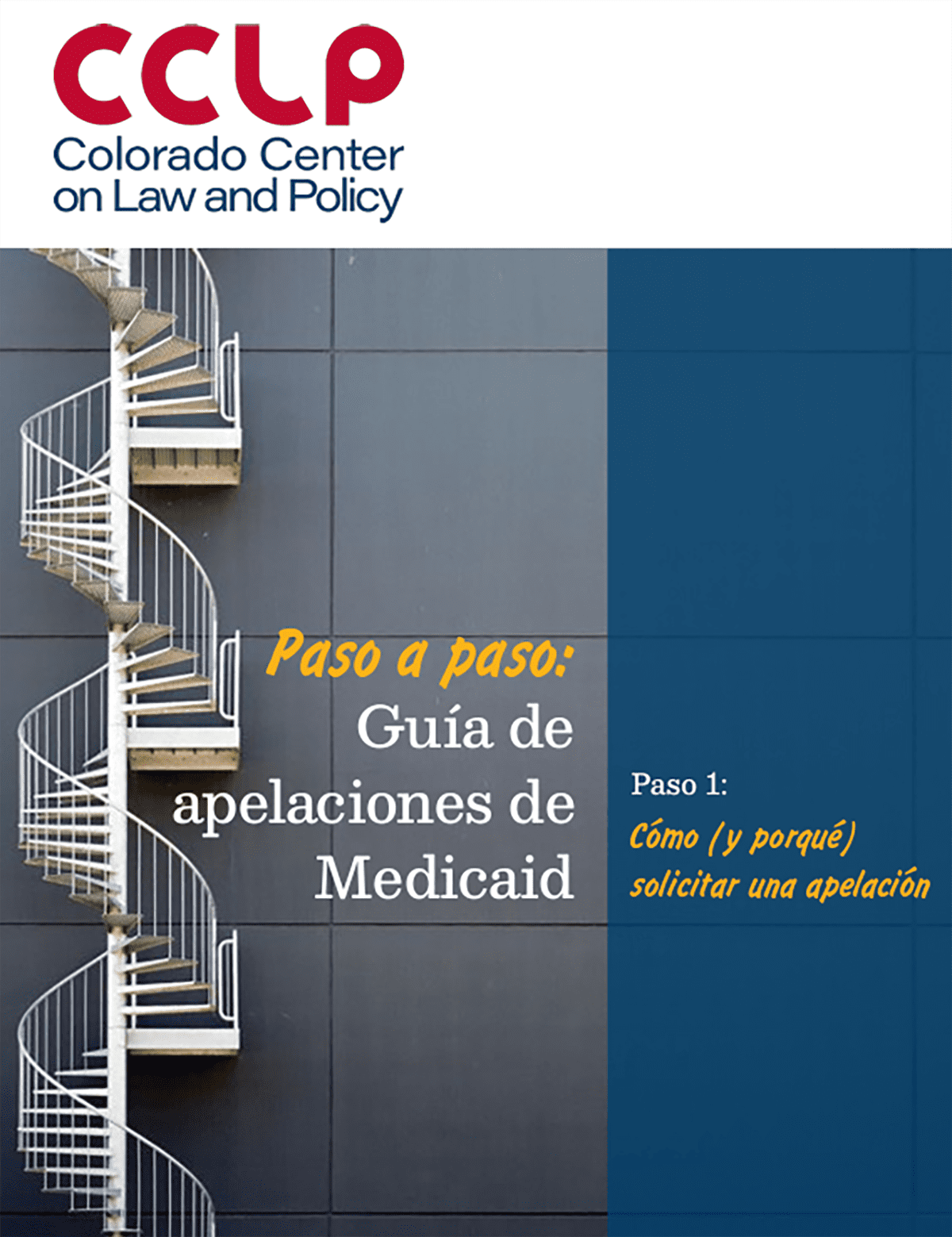
WHAT’S HAPPENING?
During the Public Health Emergency (PHE) for COVID-19, state Medicaid programs could not terminate anyone enrolled in benefits due to a provision in the Families First Coronavirus Response Act (FFCRA) that ensured continuous coverage throughout the pandemic. People kept their coverage even if they were over the income limit or did not meet other program requirements. Now, the PHE has come to an end and states have started to disenroll people who they believe are no longer eligible. In Colorado, the first terminations began on May 31, 2023.
In spring 2023, Colorado began to send out renewal paperwork that must be filled out, signed, and turned in. It is critical that you open any mail, email, or PEAK communication: Those contain important information about your Medicaid coverage and can help you take action if you learn that you have lost your benefits.
¿LO QUE ESTÁ SUCEDIENDO?
Por la duración de la emergencia de salud pública (PHE) debido a COVID-19, los programas estatales del Medicaid no podían terminar los beneficios a nadie debido a la ley federal. Las personas mantenían su cobertura médica aun si sus ingresos estaban por encima del límite o no cumplían con otros requisitos del programa. Ya que se ha acabado el PHE los estados han empezado a terminar los beneficios de las personas quien creen que ya no están elegibles. En Colorado, la primera terminación empezó el 31 de mayo de 2023.
En la primavera del 2023, Colorado empezó a enviar los paquetes de renovación que deben ser llenados, firmados, y entregados. Es crítico que abran cualquier correo, correo electrónico, o comunicación por PEAK: aquellos contienen información importante sobre tu cobertura del Medicaid y te puede ayudar en tomar medidas si averigües que hayas perdido tus beneficios.
ENGLISH SURVEY
We know this may feel like a difficult and scary time, and we’re here to listen and to help.
If you have had your benefits renewed or have lost coverage and want to share information about your experience, please fill out the survey below. The survey will take between 5-25 minutes to complete. That information will remain safe and confidential, and you can share your name or contribute anonymously. You can even share documents if you’d like or volunteer to help with the advocacy efforts.
Your story will help us better understand issues that Coloradans are facing and can help us advocate for a process that better serves all Coloradans.
To turn in the survey by email, send it with the subject line “PHE unwind” to kwallat@copolicy.org.
Or for mail use the address:
Colorado Center on Law and Policy
CC: PHE unwind
789 N. Sherman Street, Suite 300
Denver CO, 80203
ENCUESTA ESPAÑOL
Entendemos que este tiempo puede ser difícil y estresante, y estamos aquí para escucharlos y ayudarlos.
Si tus beneficios han estado renovados o has perdido tu cobertura y te gustaría contarnos de tu experiencia, por favor cumplir la encuesta en el link ubicado abajo. La encuesta tomará entre 5-25 minutos para cumplir. Tu información estará mantenida segura y confidencial- puedes compartir tu nombre o cumplirla anónimamente. Si te gustaría, también tienes la opción de adjuntar documentos, o involucrarse con actividades de promoción.
Tu historia nos ayudará entender mejor los problemas que se enfrenta la gente de Colorado y puede ayudarnos abogar por un proceso que sirve mejor para la gente de Colorado.
Para entregar la encuesta por correo electrónico, envíala con la línea de asunto “PHE Unwind Encuesta” a kwallat@copolicy.org.
O por correo usa la dirección:
Colorado Center on Law and Policy
CC: PHE unwind
789 N. Sherman Street, Suite 300
Denver CO, 80203
RESOURCES
LEGAL RESOURCES
Colorado Legal Services
Colorado Legal Services may be able to help. They provide legal help for low-income Coloradans with civil legal needs, and they are free.
Call CLS’s intake line at 303-837-1313 or contact Marcos Caballero at 303-837-2880 for Medicaid terminations ONLY.
Colorado Cross-Disability Coalition (CCDC)
Colorado Cross-Disability Coalition has non-lawyer advocates who may be able to help with appeals if you have a disability.
Call CCDC’s main office at 303-839-1775, and you can learn more at ccdconline.org/contact.
Family Voices
If your child has a disability, you may be able to get assistance from Family Voices Colorado.
Contact Family Voices: Email info@familyvoicesco.org or call 855-877-1747 or 303-877-1747.
NOTICE: This updated version of the guide is based on the latest state policies and guidance as they were understood on March 4, 2024. Those policies may be subject to further change. Check this website for future policy updates:
copolicy.org/medicaidappeals
Denied Medicaid? Know Your Rights!
If Medicaid has terminated or reduced your benefits and you disagree with that decision, the guides below may help you determine next steps!

With the end of continuous coverage requirements in Medicaid looming ever closer, we expect at least 350,000 Coloradans will lose their Medicaid coverage over the course of the next year. We are excited to introduce our 3 Medicaid Appeals Guides to help community members better understand their rights and how best to utilize these resources.
¿Medicaid Denegado? ¡Conoce Tus Derechos!
¡Si Medicaid ha terminado o reducido tus beneficios y no estás de acuerdo con la decisión, las guías ubicadas abajo pueden ayudarte determinar tus próximos pasos!

El fin de los requisitos de la cobertura continua por Medicaid sigue acercándose. Esperamos que por lo menos 350.000 personas en Colorado pierdan su cobertura de Medicaid a lo largo de este año. Estamos emocionados para presentar nuestras 3 Guías para las Apelaciones de Medicaid para apoyar a la comunidad para que entienda sus derechos y cómo utilizar estos recursos.
The 3 Medicaid Appeals Guides include:
Las 3 Guías de apelaciones de Medicaid incluyen:
Introduction to Medicaid Appeals Webinar
On May 17, 2023, Katie Wallat, CCLP’s Interim Director of Administrative Advocacy presented our Medicaid Appeals Webinar. She introduced our 3 Medicaid Appeals Guides to help community members better understand their rights and how best to utilize these resources.
Seminario web introducción a las apelaciones de Medicaid
El 17 de mayo de 2023, Katie Wallat, abogada senior de CCLP, presentó nuestro seminario web sobre apelaciones de Medicaid. Ella presentó nuestras 3 Guías para las Apelaciones de Medicaid para apoyar a la comunidad para que entienda sus derechos y cómo utilizar estos recursos.





